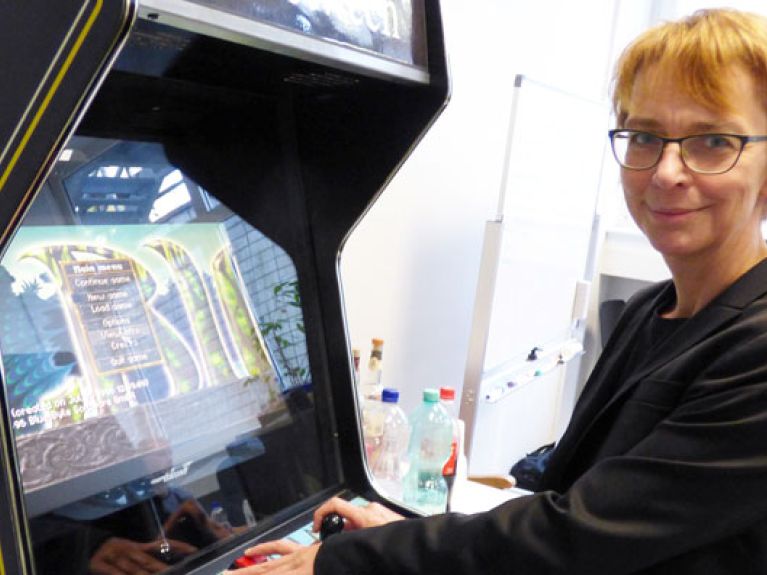How computer games can help heal wounds
Serious games can inform people about complicated issues and even reduce pain. Expert Linda Breitlauch explains the fascinating functions of this genre of games.

Ms Breitlauch, you are professor of game design at Trier University of Applied Sciences. What transforms a computer game into a good serious game?
Most importantly, the game must be fun. Players of serious games seek a challenge, they want to learn something and solve problems, and they want to improve themselves and receive feedback on improvements in their performance.
Serious games involve much more than just imparting knowledge. What can you learn from playing a serious game?
In fact, very few serious games are about the learning of facts – for example, vocabulary or capital cities. Serious games often also want to impart specific competencies. They train skills, logical and spatial thinking or certain behaviours. Companies use serious games in staff training. Psychologists, educationalists and doctors use them with trauma patients or in pain therapy. In these cases, the focus is less on learning and much more on coming to terms with something.
Can you name an example?
Snow World is a serious game that is particularly well known. It was developed for burns patients that have to go through the painful procedure of having their dressings changed every day. Doctors use Snow World during this treatment. Using a special headset, the patients immerse themselves in a virtual world and have snowball fights with snowmen in an icy landscape. The game has two positive effects. It conveys a feeling of cold and ice, which has a very calming effect on the patients. Furthermore, they are distracted by throwing snowballs and concentrate less on the pain. Although this serious game is a very simple application, the game can reduce patients’ subjective sensitivity to pain by 30 to 50%.
Can action games also achieve learning effects?
Yes, many studies confirm that action games considerably improve hand-eye coordination. In one study, researchers at the Charité – Universitätsmedizin Berlin even found that players of action games did not only have better hand-eye coordination, a stronger spatial sense and better perceptive faculties, but also a higher IQ than many non-players of action games. And strategy games, for example, train social skills, because players learn to lead a team and take responsible action.
There are many big-name German action game publishers. How do you rate German developers of serious games?
In terms of quality and content, they develop complex, high-value games that make them internationally competitive. However, the market for serious games is organised differently from that for action games. Most developers of serious games do not create blockbusters, but games for a specific target group. When a certain disease profile is involved, for example, the user group is often very small. Some good ideas then fail because of a lack of financing. This is where I would like to see far more government funding.
What are the most important innovations in serious games?
Serious games aim to create experiences that the real world does not offer. At Trier University of Applied Sciences we have developed an application, for example, in which players assume the role of an astronaut at the International Space Station (ISS). They can carry out a space walk and simulate a feeling of weightlessness. Other serious games aim to convey a feeling of empathy: for example, how do people feel who live in a war zone or suffer from a specific illness? Many applications are conceivable in areas of this kind.
Gala for the German Computer Games Award in Berlin on 26 April 2017
International Games Week Berlin
© www.deutschland.de

